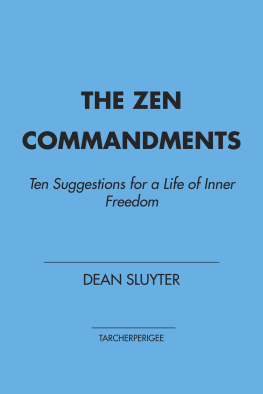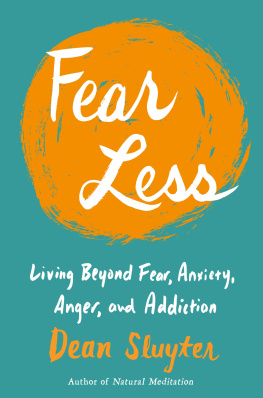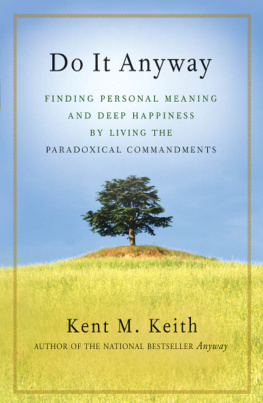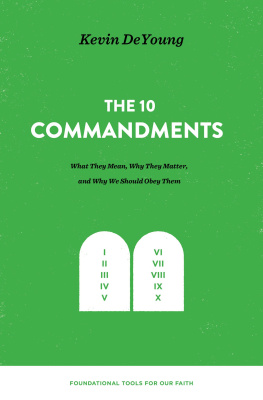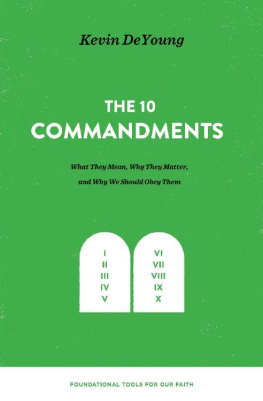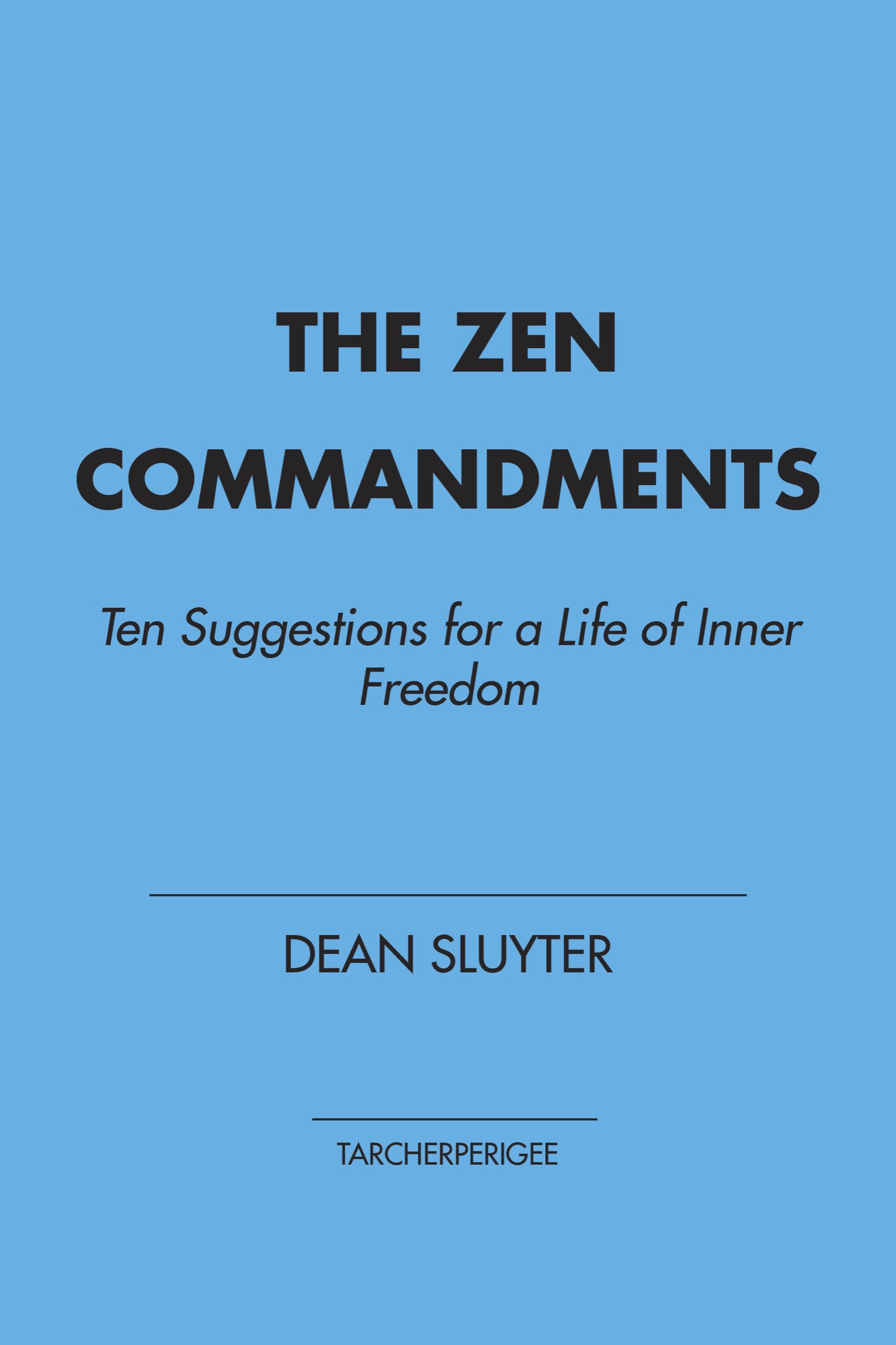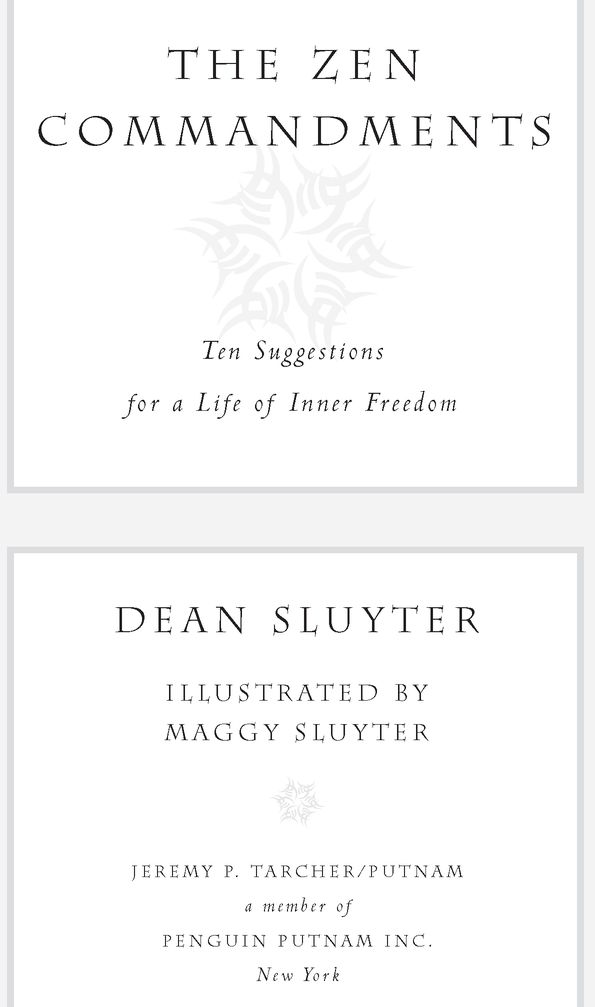Contents
Landmarks
CONTENTS
PRAISE FOR DEAN SLUYTERS
Why the Chicken Crossed the Road
and Other Hidden Enlightenment Teachings
from Buddha to Bebop to Mother Goose
This is a GREAT book! Sluyter doesnt miss a beat in his praise of the sacred and the profane on the path of spiritual enlightenment.
NAPRA Review
This smart, sassy, and idiosyncratic spiritual resource is divided into sections on cosmic jokes, sacred nursery rhymes, exploding proverbs, and accidental hymns.... Sluyter proves to be a subtle and imaginative guide through the contemporary world of pop culture, dazzling us with epiphanies.... He provides fresh takes on faith, devotion, grace, being present, beauty, practice, selflessness, forgiveness, simplicity. Like the best spiritual teachers, Sluyter lets light in from many anglesin this case, the wisdom of Buddhism, Christianity, Taoism and more. Why the Chicken Crossed the Road is a surefire demonstration of why play is an essential ingredient in spiritual growth.
Values and Visions
ALSO BY DEAN SLUYTER
Why the Chicken Crossed the Road
and Other Hidden Enlightenment Teachings
from Buddha to Bebop to Mother Goose
AUTHORS NOTE
Not being a Zen master, Ive got a lot of nerve writing about Zen. Not being a chosen prophet, Ive got chutzpah handing down commandments. But this book is about neither commandments nor Zen per se. Its about the discovery of inner freedomin Zen, but also in the Gospels, the movies, and a lot of other placesand how this freedom can lead naturally to kindness, without the need to be commanded. So Zen commandments are no commandments, as silent as one hand clapping.
What does that leave? Suggestions: skillful methods for making freedom and kindness vivid in your own life, by your own choice.
DLS
ACKNOWLEDGMENTS
I am grateful to Charles Genoud, Dan Jackson, Ellen Lewis, Jodi Manning, Sue Murray, Rob Pitera, Mary Rachel Platt, Bob Rusling, Erica Saypol, Maggy Sluyter, Tara Wings Sluyter, and Jim Vincent for their valuable feedback and suggestions. I also wish to thank Gretchen and Bill Richardson for their gracious hospitality, Jane Cavolina for her advice and encouragement, Sean McAnally for the saxophone lessons, the late Coco for keeping me company, and my agent, Jon Matson, for continuing to be a wonderful adviser and friend. Joel Fotinos and Sara Carder of Tarcher/Putnam lent their astute creative support, and my editor, the amazing Jeremy Tarcher, once again pointed the way through the wilderness. Thanks most of all to my family, who keep the party going at all hours and all costs, and to my teachers, whose 84,000 varieties of compassion reveal the translucent perfection of this moment, as is.
FOR MAGGY, DAY, AND TARA
An for every hung-up person in the whole wide universe An we gazed upon the chimes of freedom flashing.
BOB DYLAN
She hath often dreamed of unhappiness and waked herself with laughing.
MUCH ADO ABOUT NOTHING
WHAT ITS ALL ABOUT
Experiment alone can give certainty.
ALBERTUS MAGNUS
Some people are waiting for the sun to shine, but not Gene Kelly. As he performs the title song in Singin in the Rain, the weather is imperfect but thats perfectly fine with him. Hes not just coping with it, hes celebrating in itsplashing and stomping through puddles the way we did when we were kids, his smiling face turned to the sky, his umbrella (signifying all our sensible, grownup caution) closed and transformed into a graceful dance partner. I think people love this scene because it conveys the uninhibited joy that we somehow feel our lives should be about, even as the storms of messy, uncontrollable circumstances rain down upon us. Youd never guess that Kelly was running a 103-degree fever during filming.
We all probably suspect that such a life is possible. For fleeting moments we may even feel that weve grasped the secret, while reading philosophy or poetry, listening to Bach or Hendrix, scaling the mountain or making love. The light flickers on... but then flickers off again.
The big news (which is not new at all) is that we can have that light as a steady brilliance, if we know where to focus. Over the centuries, some people have stumbled onto this discovery, others have carefully stalked it, and their report is outrageous but unanimous. The lightthe kingdom of heaven or nirvana or moksha or tawhid or shekina, depending on your preferred vocabularyis within you. The dimension of boundless freedom and happiness is not in some external sensation or grand achievement, not in some holy person or next world up in the clouds, but within you. And it is within younot will be someday or can be if you behave, but is, now and always.
And finding this boundless dimension (the report continues) doesnt affect only ourselves. The more we bask in that inner light, the more we radiate it to others. Love, generosity, kindness are its natural overflow. As Gene Kelly sings:
Im laughin at clouds, so dark up above
The suns in my heart and Im ready for love.
In fact, as he walks off at the end of the song, he passes a fellow pedestrian coming the other way and, barely breaking his stride, hands him the umbrella. Its not enough to sing in the rain ourselvesweve got to pass the torch along to others, perfect strangers included.
INDESCRIBABLY DELICIOUS
Because its within you, this radiant happiness is nothing exotic, nothing extrasuperduper to be added to life like a deluxe whipped topping, but the nature of life itself, as it is already, which has somehow gone unnoticed. Its there in every moment, haunting your every act, as plain as the nose on your face and just as easily overlooked.
He who glows in the depths of your own eyesthat is the Infinite; that is the Self of yourself. He is the Beautiful One, he is the Luminous One. In all the worlds, forever and ever, he shines!
CHANDOGYA UPANISHAD
What we call saintly or enlightened people, Christs and Buddhas, have realized their inner nature, but everyone has it. All we need is clearer visionnot more concepts or beliefs, but direct experience.
Without that, were naturally skeptical. We all enjoy the jokes and cartoons in which the cross-legged guru on the mountaintop imparts some bogus secret of life: You do the Hokey Pokey and you turn yourself around. Thats what its all about. But they wouldnt be funny unless we held a deep conviction that there should be some real secret. So we keep projecting symbols of it: Shangri-La, the Holy Grail, the bluebird of happiness, the pot of gold at the end of the rainbow, the major chord at the end of the symphony, the ultimate lover (perhaps in the guise of some movie god or goddess), the ultimate home run or touchdown.
We seem to know its something indescribable, and indescribably deliciousso delicious that we give it names like heaven and nirvana and enlightenment. Its also indescribably simple. I once asked a famous chef the secret of great cooking. He said, Start with the best ingredients, and then dont screw them up. If the kingdom of nirvana is really within us, were starting with the very best ingredient of all. We just have to not screw it up, just get it in and out of the saut pan of daily living without burning it, so that its natural flavor is retained. That involves learning a few simple skills and then practicing them with persistence. My aim in this book is to suggest what those skills might be.

